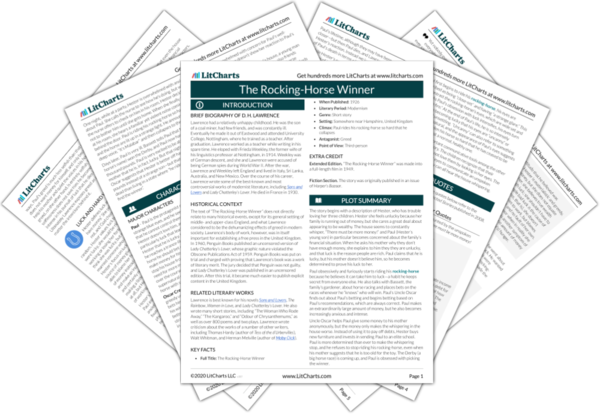Welcome to the LitCharts study guide on D. H. Lawrence's The Rocking-Horse Winner. Created by the original team behind SparkNotes, LitCharts are the world's best literature guides.
Rocking-Horse Winner: Introduction
A concise biography of D. H. Lawrence plus historical and literary context for The Rocking-Horse Winner.
Rocking-Horse Winner: Plot Summary
A quick-reference summary: The Rocking-Horse Winner on a single page.
Rocking-Horse Winner: Detailed Summary & Analysis
In-depth summary and analysis of every of The Rocking-Horse Winner. Visual theme-tracking, too.
Rocking-Horse Winner: Themes
Explanations, analysis, and visualizations of The Rocking-Horse Winner's themes.
Rocking-Horse Winner: Quotes
The Rocking-Horse Winner's important quotes, sortable by theme, character, or .
Rocking-Horse Winner: Characters
Description, analysis, and timelines for The Rocking-Horse Winner's characters.
Rocking-Horse Winner: Symbols
Explanations of The Rocking-Horse Winner's symbols, and tracking of where they appear.
Rocking-Horse Winner: Literary Devices
The Rocking-Horse Winner's key literary devices explained and sortable by chapter.
Rocking-Horse Winner: Theme Wheel
An interactive data visualization of The Rocking-Horse Winner's plot and themes.
Brief Biography of D. H. Lawrence
Lawrence had a relatively unhappy childhood. He was the son of a coal miner, had few friends, and was constantly ill. Eventually he made it out of Eastwood and attended University College, Nottingham, where he trained as a teacher. After graduation, Lawrence worked as a teacher while writing in his spare time. He eloped with Frieda Weekley, the former wife of his linguistics professor at Nottingham, in 1914. Weekley was of German descent, and she and Lawrence were accused of being German spies during World War II. After the war, Lawrence and Weekley left England and lived in Italy, Sri Lanka, Australia, and New Mexico. Over the course of his career, Lawrence wrote some of the best-known and most controversial works of modernist literature, including Sons and Lovers and Lady Chatterley’s Lover. He died in France in 1930.
Get the entire Rocking-Horse Winner LitChart as a printable PDF.

Historical Context of The Rocking-Horse Winner
The text of “The Rocking-Horse Winner” does not directly relate to many historical events, except for its general setting of middle- and upper-class England, and what Lawrence considered to be the dehumanizing effects of greed in modern society. Lawrence’s body of work, however, was in itself important for establishing a free press in the United Kingdom. In 1960, Penguin Books published an uncensored version of Lady Chatterley’s Lover, whose graphic nature violated the Obscene Publications Act of 1959. Penguin Books was put on trial and charged with proving that Lawrence’s book was a work of literary merit. The jury decided that Penguin was not guilty, and Lady Chatterley’s Lover was published in an uncensored edition. After this trial, it became much easier to publish explicit content in the United Kingdom.
Other Books Related to The Rocking-Horse Winner
Lawrence is best known for his novels Sons and Lovers, The Rainbow, Women in Love, and Lady Chatterley’s Lover. He also wrote many short stories, including “The Woman Who Rode Away,” “The Kangaroo,” and “Odour of Chrysanthemums,” as well as over 800 poems and two plays. Lawrence wrote criticism about the works of a number of other writers, including Thomas Hardy (author of Tess of the d’Urbervilles), Walt Whitman, and Herman Melville (author of Moby-Dick).
Key Facts about The Rocking-Horse Winner
- Full Title: The Rocking-Horse Winner
- When Published: 1926
- Literary Period: Modernism
- Genre: Short story
- Setting: Somewhere near Hampshire, United Kingdom
- Climax: Paul rides his rocking-horse so hard that he collapses
- Antagonist: Greed
- Point of View: Third-person
Extra Credit for The Rocking-Horse Winner
Extended Edition. “The Rocking-Horse Winner” was made into a full-length film in 1949.
Fiction Section. The story was originally published in an issue of Harper’s Bazaar.












